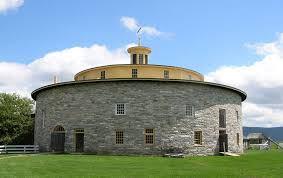
Round barn at Hancock Shaker Village
My humanist group recently toured Hancock Shaker Village, in Massachusetts. The Shakers were a religious sect that set up communes of a sort, preaching equality and, famously, celibacy. They pretty much died out. No surprise.
Unlike some sects (notably the Amish), the Shakers loved new technology and were often clever in applying it; they were efficiency freaks. They lived dormitory-style, men and women separate.

The attempt to write sexuality out of human life has many antecedents. At least the Shakers did not go as far as Russia’s Skoptsy, a religious sect whose answer for controlling sexuality was castration. But sex being dirty is a big theme in many religious contexts.

With the Shakers, it may really have been rooted in their founder Ann Lee’s bad experience with marriage and procreation. She was not the only 18th century woman who felt that way, and that women would be better off free of it all. But that notion was very politically incorrect – better to cloak celibacy in a mantle of religious justification. So the Shakers were told celibacy enabled them to get closer to God. Or something like that.
Anyhow, one can see why women might buy into this. Less so for men. And indeed, over time, more men than women abandoned Shakerdom, which became mostly female.
But not only was celibacy a fundamental denial of human nature; so was the equality fetish. As our tour guide explained, that would be attractive to people who were not being treated equally in the outside world. However, the thirst for status is deeply rooted in the human psyche (by evolution – higher status meant more mating opportunities, so genes for status-seeking proliferated). And Shakerdom was down on the whole idea of self-actualization. Everything you did was supposed to be for the good of the community, and to please God – not yourself.

It helps to remember that the concept of happiness is a modern invention. People in earlier times did not think that way. The point of life was not to be happy, but just to get through it. That was a hard enough challenge. (And entering a Shaker commune freed you of worry over your next meal.)
Of course people always craved pleasure and shunned suffering. Only a robot wouldn’t. But what differed was how they thought about it. Indeed, actually, that they didn’t.

Hancock Shaker Village was enjoyable to visit. But I was glad to return to modern life.
